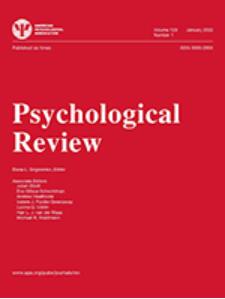无神经生物的行为可塑性
IF 5.1
1区 心理学
Q1 PSYCHOLOGY
引用次数: 0
摘要
认知过程有助于行为可塑性(学习)并与大脑功能密切相关,当代心理学家可能很少会反对这一观点。然而,越来越多的证据表明,行为可塑性存在于缺乏神经元的生物体(即无神经生物体)中。这种可能性意味着至少某些认知过程可能早于神经系统的进化。本文在一个强调四个层次分析的机理框架内回顾了无神经生物的学习证据:心理、神经生物学、神经化学和细胞分子。据报道,一些无神经生物体内存在从习惯化到条件反射的学习现象,本研究对一些关键实例进行了综述,并关注了潜在机制的证据。物种比较以同源性和同源性这一核心进化概念为框架。这些证据提出了一个问题:神经元的进化支持了哪些以前不可能实现的新行为能力?(PsycInfo Database Record (c) 2024 APA, 版权所有)。本文章由计算机程序翻译,如有差异,请以英文原文为准。
Behavioral plasticity in aneural organisms.
Few contemporary psychologists would probably object to the notion that cognitive processes contribute to behavioral plasticity (learning) and are intimately linked to brain function. However, growing evidence suggests that behavioral plasticity is present in organisms lacking neurons (i.e., aneural organisms). This possibility would imply that at least some cognitive processes might have preceded the evolution of nervous systems. Evidence of learning in aneural organisms is reviewed within a mechanistic framework emphasizing four levels of analysis: psychological, neurobiological, neurochemical, and cell-molecular. Learning phenomena ranging from habituation to conditioning have been reported in some aneural organisms, and some key examples are reviewed with attention to evidence of underlying mechanisms. Species comparisons are framed in terms of the central evolutionary concepts of homology and homoplasy. This evidence raises the question of what new behavioral capacities were supported by the evolution of neurons that were not possible before. (PsycInfo Database Record (c) 2024 APA, all rights reserved).
求助全文
通过发布文献求助,成功后即可免费获取论文全文。
去求助
来源期刊

Psychological review
医学-心理学
CiteScore
9.70
自引率
5.60%
发文量
97
期刊介绍:
Psychological Review publishes articles that make important theoretical contributions to any area of scientific psychology, including systematic evaluation of alternative theories.
 求助内容:
求助内容: 应助结果提醒方式:
应助结果提醒方式:


